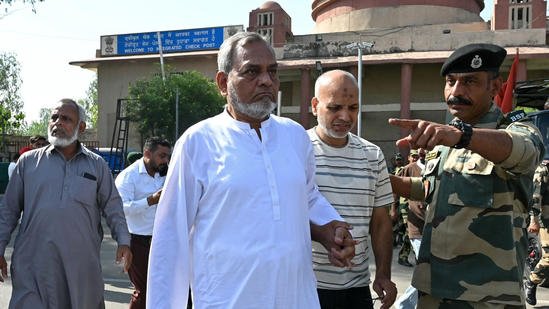Following the deadly terrorist attack in Pahalgam, Jammu and Kashmir, the Indian government has taken a hard-line stance by issuing a 48-hour deadline to Pakistani nationals residing in India without essential or diplomatic status. In response, dozens of Pakistani citizens began exiting the country through the Attari-Wagah border, as tensions between the two neighbours hit a fresh low.
This move is part of a wider diplomatic and national security response by New Delhi, aimed at sending a strong message to Islamabad after intelligence reports linked the Pahalgam attack to terror groups based in Pakistan. The crackdown has triggered discussions on cross-border relations, people-to-people exchanges, and the use of land borders in sensitive times.
The Pahalgam Attack and India’s Tough Response
The Pahalgam attack occurred when a convoy of Indian Army vehicles was ambushed by heavily armed terrorists in South Kashmir. The incident left several soldiers dead and many injured. It has since been linked to Pakistan-based terror outfits like Jaish-e-Mohammed and Lashkar-e-Taiba, according to preliminary investigations by Indian security agencies.
In the aftermath, the Indian government swiftly moved to issue an order mandating all Pakistani nationals without valid diplomatic credentials or essential visas to leave Indian territory within 48 hours. This sudden move came as part of a broader plan to escalate pressure on Pakistan diplomatically and demonstrate zero tolerance for cross-border terrorism.
Attari-Wagah Border: The Primary Exit Point
With few land crossings between India and Pakistan, the Attari-Wagah border in Punjab became the main exit point for Pakistani nationals. On the final day of the deadline, visuals from the border showed several individuals and families—some residing in India for education, medical treatment, or extended family visits—lining up with luggage and documents.
Many of them expressed disappointment but acknowledged the political climate. “I came here to attend a wedding in Delhi. It’s unfortunate what happened in Kashmir, but I have to leave because of the government order,” said a Pakistani citizen waiting at the Attari border.
Security was heightened at the border crossing, with both immigration and intelligence agencies on alert. While the crossing remains open for diplomatic, trade-related, and humanitarian purposes, the flow of civilian movement has reduced drastically in recent days.
Diplomatic Fallout and Broader Implications
This action comes on the heels of India declaring two Pakistani military diplomats as persona non grata, following allegations of espionage and support for terrorist groups. These decisions together signal a significant freeze in diplomatic warmth and may impact ongoing dialogues through regional platforms like SAARC.
India’s strong response has also reignited debates around the Indus Water Treaty, with some political voices calling for its review. Signed in 1960, the treaty governs the use of the Indus River system and has remained intact through wars and conflict. However, fresh provocations have led to calls for reassessing India’s position on the pact.
Meanwhile, the shutdown of people-to-people ties, even temporarily, could have long-term social and cultural consequences. Families split across the border, patients undergoing treatment in Indian hospitals, and students in academic institutions are likely to be the most affected.
What Lies Ahead
While the immediate evacuation of Pakistani nationals is now underway, questions remain about how long these restrictions will last and whether they will be extended to other categories of travellers. The government has not ruled out further measures, depending on Pakistan’s response and developments in Jammu and Kashmir.
For now, the exit of Pakistani citizens through the Attari border marks a symbolic yet significant moment in the downward spiral of India-Pakistan relations. It underscores New Delhi’s hardened stance on terrorism and its determination to hold Pakistan accountable on global platforms.
As India continues to monitor the situation closely, further developments at the diplomatic, security, and humanitarian levels are expected in the coming weeks. The message from India is clear: national security will come first, and state-sponsored terrorism will face consequences, both at home and across borders.

